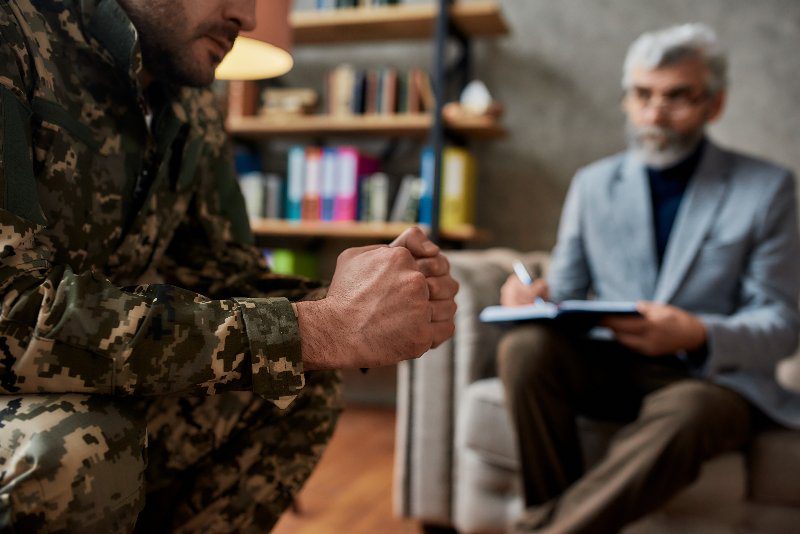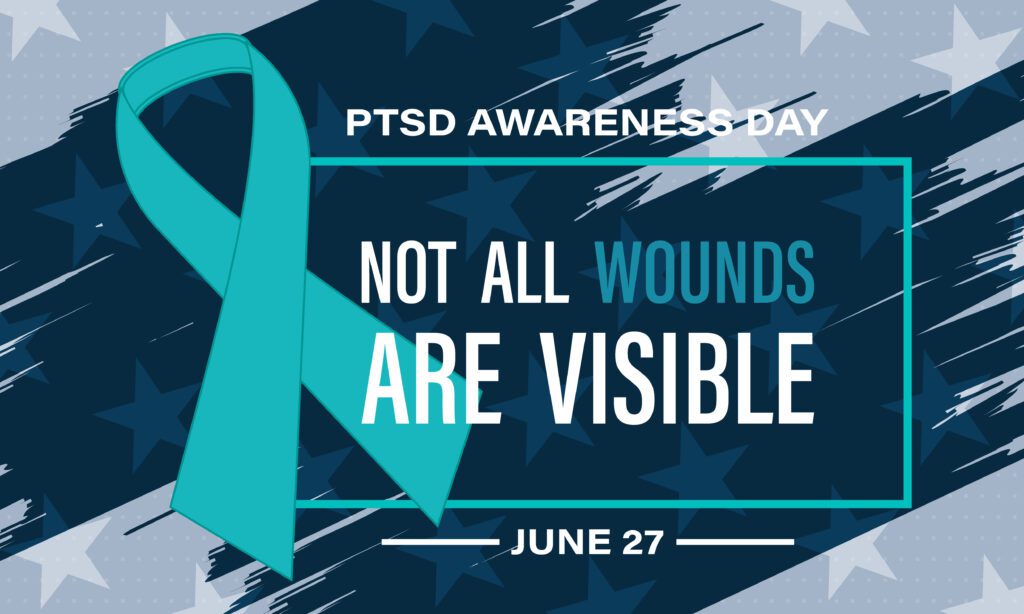Post-traumatic stress disorder (PTSD) affects about 20% of US military Veterans. It is also a major cause of mortality for these men and women. While PTSD extends beyond the military, war Veterans are especially susceptible to this condition.

Therapy for Veterans with PTSD
Not only are Veterans more likely to have PTSD, but they also suffer from a lack of available resources. Timely access to therapy for Veterans with PTSD can have a tremendous positive affect on your quality of life.
In this article, we will explore a few of the most common types of recurring PTSD therapies that can help bring relief in both the short and long term.
What Are My Treatment Options?
When you dive into PTSD research, it can be hard to sort through all the options, seeing as you have a variety to educate yourself on.
To help simplify things, we’ve broken down some of the most common and effective therapy options for Veterans suffering from PTSD.

Cognitive Behavior Therapy (CBT)

Cognitive behavior therapy (CBT) is a kind of psychotherapy that is effective in treating PTSD.
The great thing about CBT is that its short and long-term results can bring about lasting relief.
CBT is centered on the traumatic event(s) regarding treatment. The goal is to identify, examine, and change thought and behavior patterns. It’s an active treatment, meaning that patients will have to engage outside of their weekly sessions.
Prolonged Exposure (PE)

Prolonged exposure (PE) therapy is a form of CBT that aims to help Veterans stop avoiding trauma triggers.
While avoiding reminders of your trauma may help alleviate symptoms in the short term, it is not a sustainable solution. PE therapy can help you face your fears and develop healthier thinking and behavioral patterns.

Cognitive Processing Therapy (CPT)

Cognitive processing therapy (CPT) is another form of CBT, but it is different in that it aims to foster recognition and reevaluation of thinking related to trauma.
The treatment process concentrates on perspective and how people view themselves and the rest of the world after a traumatic event.
For Veterans who place blame on themselves for traumatic events, this type of therapy can be especially effective and necessary. CPT helps you learn to evaluate whether your thoughts are based on facts and find more productive ways of viewing your trauma.

Stress Inoculation Training (SIT)

Stress inoculation training (SIT) is a type of CBT that can teach Veterans to reduce anxiety through stress coping skills.
The main goal of SIT is to teach you to react differently when symptoms arise. SIT can be used as a standalone treatment, but it can also go hand-in-hand with other types of CBT. This can make it an effective addition to any Veteran’s treatment plan.
Eye Movement Desensitization & Reprocessing (EMDR)

EMDR is a type of therapy that is used to treat trauma, depression, phobias and grief.
This therapy doesn’t require the patient to do much talking in their EMDR appointments past the initial assessment where you’ll talk about your traumas and work out a treatment plan with your therapist.
During the EMDR appointment, you will think of the stressing event as the therapist leads you through the trauma by way of images, emotions, and body sensations. This therapy helps the logical side of your brain work with the emotional side of the brain to process trauma.
Two prerequisites for this therapy are needed. The first is that the patient must have good vision and the second is that the patient must have good coping skills in place because the first few sessions can be very triggering.

Although the first few sessions can be hard, there is good news for Veterans who chose this mode of therapy to treat their PTSD. A report by the National Library of Medicine states that “previous published research indicate that EMDR therapy can resolve a single-incident trauma memory in three to-six sessions 77–100% of the time.”
The Importance of Recurring Therapy

As you can see, there are lots of options to choose from. Your healthcare provider will be able to assess your symptoms and know which treatment plan is best for your unique needs.
In the short term, there are many tips and tricks to alleviate the struggle of PTSD. However, recurring therapy can bring about long-term relief. While it may be tempting to decrease the number of prescribed sessions or skip them altogether, studies show that healing comes with adhering to consistent therapy sessions.

Recurring Veteran PTSD Therapy
If you’re looking for a veteran PTSD therapy program, you’ll want to find one that provides high-quality care on a recurring schedule. Getting diagnosed is the first step. After receiving the diagnosis, you may decide that ongoing therapy is the next right step for you.
Veterans suffering from PTSD could greatly benefit from recurring therapy for PTSD, but it’s not always easy to access the level of high-quality care you deserve.
Talk with your doctor or therapist about setting up a plan and schedule to get the quality care you deserve.







































